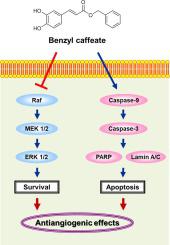Journal of Functional Foods ( IF 3.8 ) Pub Date : 2022-04-18 , DOI: 10.1016/j.jff.2022.105079 Ho-Jeong Bang 1, 2 , Eunju Yoon 1, 2, 3 , Sun Wook Kim 4 , Mok-Ryeon Ahn 1, 2, 3

|
Caffeic acid and its derivatives are polyphenolic compounds, which are present in high concentration in propolis and medicinal plants. Their antioxidant activity has been reported; however, the antiangiogenic effects of benzyl caffeate remain unclear. In this study, we investigated the angiogenic and apoptotic effects of benzyl caffeate both in vitro on HUVECs and in vivo in chick embryo chorionic membrane (CAM) models. Benzyl caffeate significantly inhibited angiogenesis via HUVECs-based tube formation by inducing apoptosis and antiproliferative effects on endothelial cells. Furthermore, benzyl caffeate significantly reduced the number of newly formed vessels in CAM. Western blot analysis showed that benzyl caffeate induced apoptosis via proapototic signaling via activation of caspase-9, caspase-3 and cleavage of PARP and lamin A/C. In addition, western blot showed that benzyl caffeate treatment inhibited c-Raf/MEK/ERK signaling, and thereby suppressed angiogenesis. In conclusion, the results indicate that benzyl caffeate exerts its antiangiogenic effects via induction of endothelial apoptosis.
中文翻译:

咖啡酸苄酯对人脐静脉内皮细胞 (HUVECs) 和鸡胚绒毛尿囊膜 (CAM) 的抗血管生成和凋亡作用:体外和体内模型
咖啡酸及其衍生物是多酚类化合物,高浓度存在于蜂胶和药用植物中。已经报道了它们的抗氧化活性;然而,咖啡酸苄酯的抗血管生成作用仍不清楚。在这项研究中,我们研究了咖啡酸苄酯在体外对 HUVECs 和在鸡胚绒毛膜 (CAM) 模型中的体内血管生成和凋亡作用。咖啡酸苄酯通过诱导细胞凋亡和对内皮细胞的抗增殖作用,通过基于 HUVEC 的管形成显着抑制血管生成。此外,咖啡酸苄酯显着减少了 CAM 中新形成的血管数量。Western印迹分析显示,咖啡酸苄酯通过促凋亡信号传导通过激活caspase-9、caspase-3和切割PARP和核纤层蛋白A/C来诱导细胞凋亡。此外,蛋白质印迹显示,咖啡酸苄酯处理抑制 c-Raf/MEK/ERK 信号传导,从而抑制血管生成。总之,结果表明,咖啡酸苄酯通过诱导内皮细胞凋亡发挥其抗血管生成作用。






























 京公网安备 11010802027423号
京公网安备 11010802027423号